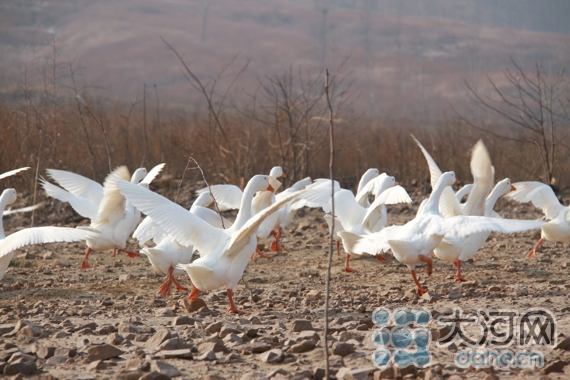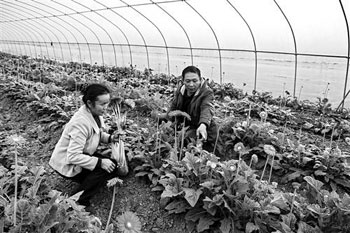Tsinghua Master abandoned the high salary to return to his hometown to raise original ecological agricultural products and sell them to Beijing.

The big white goose on the farm
A firewood egg sold for 3 yuan, the mountain mutton "net" was sent to Beijing, the farm "opened" to the mobile phone, this amazing entrepreneurial achievement was unexpectedly achieved by a young man in Ye County. The original intention of his leaving Beijing to return to his hometown to start a business is to enable everyone to eat the original agricultural products and lead the villagers in his hometown to become rich.
Free-range firewood chickens look for food in the grass on the hillside
Golden thatch, bright green rape, colorful pheasants leaping up and down in the mountains, cattle mooing, lambs basking in the warm winter sun, and big white geese swimming leisurely in the pond. In Youfangtou Village, Xiali Township, Ye County, Jingqi's farm is like an all-natural animal health bar, where animals enjoy the gifts of nature.
Jingqi is introducing his entrepreneurial experience to the reporter.
When the reporter came to the farm on December 17, Jing Qi, the owner of the farm, was communicating with customers online about picking up the goods. Surprisingly, this bespectacled, mild-mannered middle-aged man is a veritable high achiever, but also a former senior executive of a central enterprise. What made him give up his high salary and go back to his hometown to raise sheep and feed chickens? With doubt, we walked into the farm together.
Tsinghua Master gives up high salary to leave the city and go home to raise sheep and chickens.
In 1976, Jingqi was born in Shiyangzhuang Village, Yeyi Town, Yexian County. In 1997, he was admitted to Hunan University with high marks as an automation major. From 2001 to 2014, he worked for FiberHome, an influential communications company in the country, and served as the director of the company's telecom network department with an annual salary of hundreds of thousands of yuan.
After working, Jing Qi also studied for a master's degree in communications engineering at Tsinghua University, while his wife was a master's degree student at Renmin University of China. In the eyes of relatives, friends and classmates in their hometown, Jingqi couple are typical social elites. They live comfortably by buying houses and cars in Beijing.
"the friends around me are a group of rural children who squeezed through the single-log bridge of the college entrance examination and jumped out of the dragon door, with a master's degree or above, decent jobs and considerable income." Jingqi said that after living in big cities such as Beijing for a long time, they found some common problems: clenbuterol, gutter oil, fake mutton and expansive strawberries were hidden around them, and more and more people encountered health problems. As children come to the world one after another, they begin to put food safety in an important position. In order to eat fleshy meat, they have to drive thousands of miles back from their hometown; in order to eat vegetables, they rent a piece of land the size of a slap in the suburbs; in order to eat healthy eggs, they order "high-end" expensive organic eggs.
In 2014, the 38-year-old Jing Qi made a very "wayward" decision in his life: resign and go back to his hometown to raise sheep and feed chickens. "We have a local complex that fits into our bones. We hope to find a side of land to do something for our families, relatives and friends, and for the food safety of more people. We also hope to bring a little change to our hometown on our own." Jingqi said with emotion.
The idea of Jingqi returning to his hometown to start a business frightened all his relatives except his wife. "I was very opposed at that time. Now that he has a successful career in Beijing, why does he have to come back to the countryside?" Jing Qi's brother Jing Weixin said.
In order to choose the location of the farm, his wife accompanied him to run two pairs of shoes.
With the passion and dream of starting a business, Jingqi finally resigned and returned to his hometown Yexian to find a suitable farm. Jingqi has almost traveled all over the mountains and rivers of his hometown, not only to consider the natural environment and stay away from pollution, but also to take into account government planning, property rights and the wishes of villagers. At that time, his freelance wife helped him do a lot of initial research work. The wife, who broke two pairs of shoes in succession, joked: "the first income of the farm in the future should remember to buy me shoes!"
Step on iron shoes and finally find the Pure Land. In the painstaking search, Jingqi's relatives and classmates in his hometown gave him a lot of help, and finally found an ideal site at the foot of Funiu Mountain-Daoguquan Natural Village, Youfangtou Village, Xiali Township, Ye County. This is a remote mountain village named after a natural spring, surrounded by mountains and streams, clear springs, simple folkways, and a relatively flat hillside, with unique advantages for the development of farms.
Jingqi and three friends invested a total of 3 million yuan to contract 500 mu of barren mountains in Daoguquan Village and registered Yexian Tianheng Agricultural Development Co., Ltd. From building roads, building electricity, digging wells, building sheds, and building farms on the bare hills. With the arrival of the first batch of more than 100 sheep and hundreds of firewood chickens, Jingqi's farm was opened.
The sheep shed was lifted to the hillside hundreds of meters away.
The road to success is not always plain sailing. In 2014, Yexian County suffered a severe drought. In order to protect water for people and livestock, dozens of mu of peanut grains on the farm were not harvested, and sparse peanut seedlings all became winter rations for sheep. Due to lack of experience, a large number of chickens purchased died, and the final survival rate was less than 30%. Plateau sheep purchased from remote areas do not adapt to the local climate, resulting in successive deaths In May 2015, the worst hail in a century lifted the sheep shed to a hillside hundreds of meters away, directly losing more than 300,000 yuan.
"it was very windy that night. As soon as I opened the door, good boy, there was a lot of hail. Looking to the side of the sheep barn, I was silly. The sheep stood there and the shed was gone. " Recalling the scene at that time, Jingqi still had lingering fears.
- Prev

There is a great demand for African chrysanthemum with an annual net income of 20,000 yuan per mu.
There is a great demand for African chrysanthemum with an annual net income of 20,000 yuan per mu.
- Next

Orange Garden girls "hugging groups" to break the road for e-commerce to become rich.
Orange Garden girls "hugging groups" to break the road for e-commerce to become rich.
Related
- A course of planting techniques and methods on how to grow carrots
- How to plant the latest tulips?
- Is it better to pick tea in the morning or in the afternoon? When is the best time for tea to be picked? what is the third or fifth tea?
- Launch Yuanxiao Happy combination Haocha + Tea Yuan healthy Taste
- Penghu Tourism "Fireworks 20 Parade with You"
- 2022 West Lake Happiness holds "Digital Revitalization Voucher" and draws iphone13 and laptop.
- Banqiao Fuzhou social houses are designed to change start-up combined with police elimination to create a safe and livable environment
- The convenient measure of "mechanical weeding" in Xinbei has been abused and the Agriculture Bureau has imposed heavy penalties on the illegal land consolidation.
- Changgeng University Joins Hands with Four Memory Factories to Rescue Memory Talent Shortage
- The list of Taiwan's top 100 MVP managers is listed by the Director-General of the Farmers' Association of Sanxia District.

